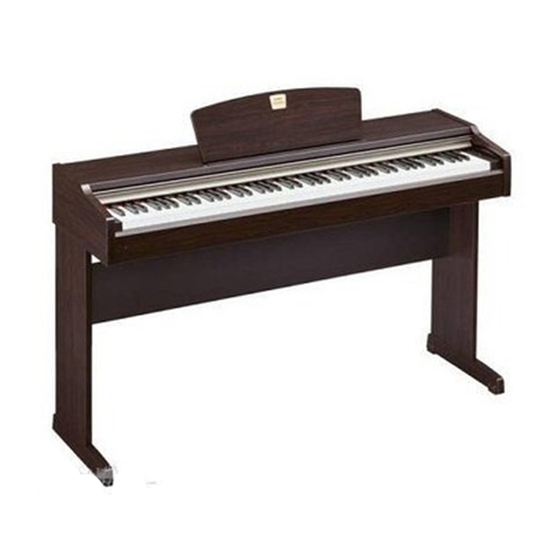Yamaha Clavinova CLP-110 Instrukcja obsługi - Strona 6
Przeglądaj online lub pobierz pdf Instrukcja obsługi dla Klawiatura elektroniczna Yamaha Clavinova CLP-110. Yamaha Clavinova CLP-110 46 stron. Yamaha digital piano owner's manual
Również dla Yamaha Clavinova CLP-110: Skrócona instrukcja obsługi (2 strony), (francuski) Tryb zatrudnienia (46 strony), (Niemiecki) Instrukcja obsługi (46 strony)

PLEASE READ CAREFULLY BEFORE PROCEEDING
WARNING
Always follow the basic precautions listed below to avoid the possibility of serious injury or even
death from electrical shock, short-circuiting, damages, fire or other hazards. These precautions
include, but are not limited to, the following:
Power supply/Power cord
G
Only use the voltage specified as correct for the instrument. The
required voltage is printed on the name plate of the instrument.
G
Check the electric plug periodically and remove any dirt or dust
which may have accumulated on it.
G
Use only the supplied power cord/plug.
G
Do not place the power cord near heat sources such as heaters
or radiators, and do not excessively bend or otherwise damage
the cord, place heavy objects on it, or place it in a position
where anyone could walk on, trip over, or roll anything over it.
Do not open
G
Do not open the instrument or attempt to disassemble the inter-
nal parts or modify them in any way. The instrument contains no
user-serviceable parts. If it should appear to be malfunctioning,
discontinue use immediately and have it inspected by qualified
Yamaha service personnel.
CAUTION
Always follow the basic precautions listed below to avoid the possibility of physical injury to you or
others, or damage to the instrument or other property. These precautions include, but are not limited
to, the following:
Power supply/Power cord
G
When removing the electric plug from the instrument or an out-
let, always hold the plug itself and not the cord. Pulling by the
cord can damage it.
G
Remove the electric plug from the outlet when the instrument is
not to be used for extended periods of time, or during electrical
storms.
G
Do not connect the instrument to an electrical outlet using a
multiple-connector. Doing so can result in lower sound quality,
or possibly cause overheating in the outlet.
Assembly
G
Read carefully the attached documentation explaining the
assembly process. Failure to assemble the instrument in the
proper sequence might result in damage to the instrument or
even injury.
6
PRECAUTIONS
CLP-110
PRECAUTIONS
* Please keep this manual in a safe place for future reference.
Water warning
G
Do not expose the instrument to rain, use it near water or in
damp or wet conditions, or place containers on it containing liq-
uids which might spill into any openings.
G
Never insert or remove an electric plug with wet hands.
Fire warning
G
Do not put burning items, such as candles, on the unit.
A burning item may fall over and cause a fire.
If you notice any abnormality
G
If the power cord or plug becomes frayed or damaged, or if there
is a sudden loss of sound during use of the instrument, or if any
unusual smells or smoke should appear to be caused by it,
immediately turn off the power switch, disconnect the electric
plug from the outlet, and have the instrument inspected by qual-
ified Yamaha service personnel.
Location
G
Do not expose the instrument to excessive dust or vibrations, or
extreme cold or heat (such as in direct sunlight, near a heater,
or in a car during the day) to prevent the possibility of panel dis-
figuration or damage to the internal components.
G
Do not use the instrument in the vicinity of a TV, radio, stereo
equipment, mobile phone, or other electric devices. Otherwise,
the instrument, TV, or radio may generate noise.
G
Do not place the instrument in an unstable position where it
might accidentally fall over.
G
Before moving the instrument, remove all connected cables.
G
Do not place the instrument against a wall (allow at least 3 cm/
one-inch from the wall), since this can cause inadequate air cir-
culation, and possibly result in the instrument overheating.
1/2
(1)B-7
